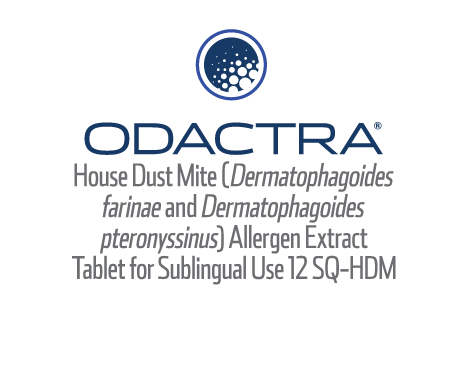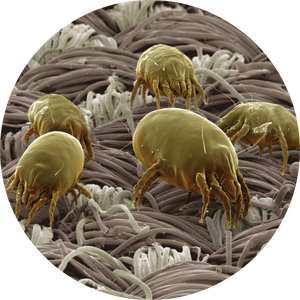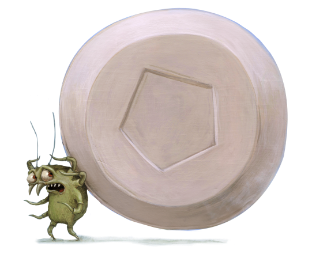What is ODACTRA?
ODACTRA is a prescription medicine used for sublingual (under the tongue) immunotherapy to treat house dust mite allergies that can cause sneezing, runny or itchy nose, stuffy or congested nose, or itchy and watery eyes. ODACTRA may be prescribed for persons 5 through 65 years of age who are allergic to house dust mites. ODACTRA is NOT a medication that gives immediate relief for symptoms of house dust mite allergy.
Selected Important Safety Information about ODACTRA
What is the most important information I should know about ODACTRA?
-
ODACTRA can cause severe allergic reactions that may be life-threatening. If any of these symptoms occur, stop taking ODACTRA and immediately seek medical care:
- Trouble breathing
- Throat tightness or swelling
- Trouble swallowing or speaking
- Dizziness or fainting
- Rapid or weak heartbeat
- Severe stomach cramps or pain, vomiting, or diarrhea
- Severe flushing or itching of the skin
-
For home administration of ODACTRA, your doctor will prescribe epinephrine, a medicine you can use if you or your child has a severe allergic reaction after taking ODACTRA. Your doctor will train and instruct you on the proper use of epinephrine.
-
If you or your child forgets to take ODACTRA, do not take two tablets. Take the next tablet at your normal scheduled time the next day. If you or your child misses more than one dose of ODACTRA, contact your healthcare provider before restarting.
-
Do not take ODACTRA if you or your child:
-
has severe, unstable or uncontrolled asthma
-
had a severe allergic reaction in the past that included any these symptoms: trouble breathing, dizziness or fainting, rapid or weak heartbeat
-
has ever had difficulty with breathing due to swelling of the throat or upper airway after using any sublingual immunotherapy before
- has ever been diagnosed with eosinophilic esophagitis
-
is allergic to any of the inactive ingredients contained in ODACTRA. The inactive ingredients contained in ODACTRA are: gelatin, mannitol, and sodium hydroxide.
-
Your doctor may decide that ODACTRA is not the best treatment if you or your child:
-
has asthma, depending on how severe it is
-
suffers from lung disease such as chronic obstructive pulmonary disease (COPD)
-
suffers from heart disease such as coronary artery disease, an irregular heart rhythm, or you have hypertension that is not well controlled
-
is pregnant, plans to become pregnant during the time you will be taking ODACTRA, or is breast-feeding
-
is unable or unwilling to administer epinephrine to treat a severe allergic reaction to ODACTRA
-
is taking certain medicines that enhance the likelihood of a severe reaction, or interfere with the treatment of a severe reaction. These medicines include:
-
Beta blockers and alpha-blockers (prescribed for high blood pressure)
-
Cardiac glycosides (prescribed for heart failure or problems with heart rhythm)
-
Diuretics (prescribed for heart conditions and high blood pressure)
- Ergot alkaloids (prescribed for migraine headache)
-
Monoamine oxidase inhibitors or tricyclic antidepressants (prescribed for depression)
- Thyroid hormone (prescribed for low thyroid activity)
-
is receiving allergy shots or other immunotherapy under the tongue. Use of more than one of these types of medicines together may increase the likelihood of a severe allergic reaction
-
Stop taking ODACTRA and contact your doctor if you or your child has any mouth surgery procedures (such as tooth removal), develops any mouth infections, ulcers or cuts in the mouth or throat, or has heartburn, difficulty swallowing, pain with swallowing, chest pain that does not go away or worsens, asthma or any other breathing condition that gets worse, or any type of serious allergic reaction.
-
The most commonly reported side effects were throat irritation/tickle, itching in the mouth or ears, swelling of the back of the mouth, lips or tongue, tongue pain, nausea, throat swelling, stomach pain, tongue ulcer/sore on the tongue, and mouth ulcer/sore in the mouth, diarrhea, vomiting, and food tastes different. These side effects, by themselves, were not dangerous or life-threatening. Typically, these common side effects begin within the first week of starting ODACTRA and may reoccur for up to two weeks. These common side effects experienced after taking the first tablet typically last up to one hour.
You are encouraged to report negative side effects of prescription drugs to the FDA.
Visit
www.fda.gov/medwatch or call
1-800-FDA-1088.
Please see full Prescribing Information, including Boxed WARNING and Medication Guide, for additional Important Safety Information.
This information does not take the place of talking to your doctor or healthcare professional. Be sure to talk to your doctor about ODACTRA and how to take it. Your doctor is the best person to help you decide if ODACTRA is right for you.
![]() 0 miles away
0 miles away











